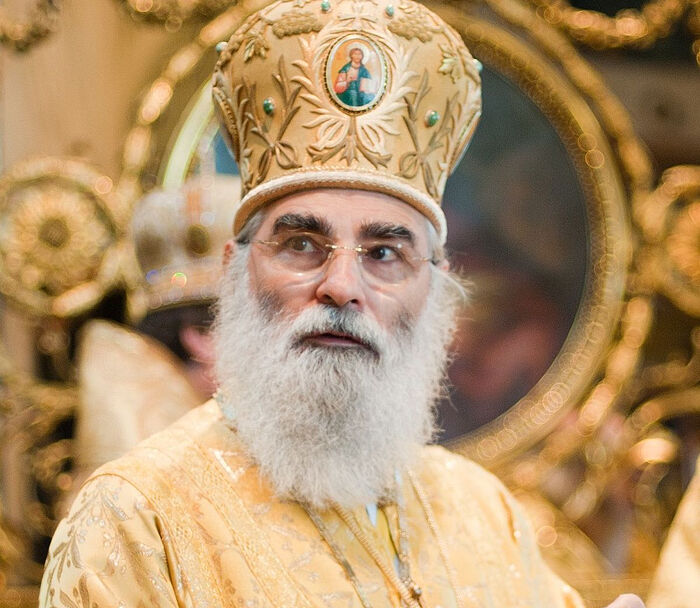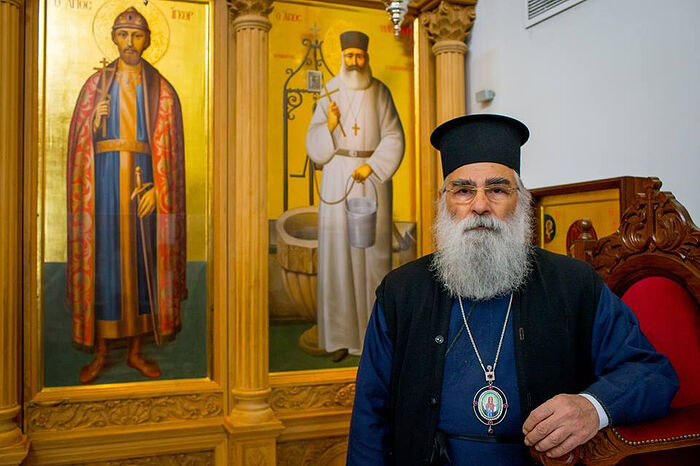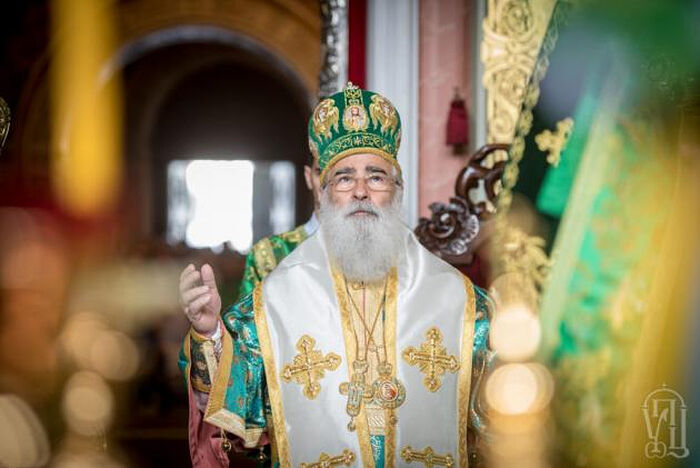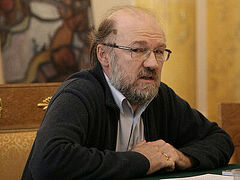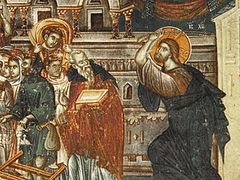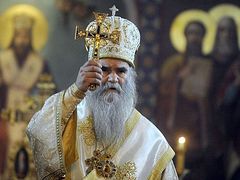In this interview with Orthodox Life, Metropolitan Timothy (Margaritis) of Bostra of the Jerusalem Orthodox Church speaks about the dangers of globalization and depression due to the crisis, and interaction with the youth.
—What is your attitude towards globalization? We see the widespread desolation of churches. Christian symbols become souvenirs. Churches are rented to other religious confessions or are turned into entertainment centers. As the prophecy says: And on the temple shall be the abomination of desolations (Dan. 9:27). How can this global problem be solved?
—Globalization, as they say, is aimed at the union of peoples, their mutual acquaintance and cooperation, their peaceful co-existence, and, as we would like to believe, helping weaker peoples, which has not yet been implemented to the degree we would like. Theoretically, this all sounds like a very positive movement and a wholly commendable initiative.
However, in the name of this globalization, indirectly or at the instigation of internal legislation, peoples are called upon to renounce their national and cultural traditions, to revise historical events, and most importantly, to “renew” religious values and beliefs for the sake of the “peaceful coexistence” of various peoples in every country and around the world.
This process is carried out systematically, so a “new” order would be gradually formulated in society with new conditions and habits that were hitherto alien to the natural life of peoples. In all of this, those who are in conditions of prosperity are very concerned about security, while those in conditions of poverty are concerned about survival. Emotions and anxiety make most people lose sight of the spiritual dimension of man and the posthumous course of his soul, the salvation of which does not interest people. They don’t find time to deal with these questions, so they ignore and even ridicule them.
As a result of this behavior, there is secularization in the Church, especially in the Western world, which pulls “our” East after it through the fashion for all things Western. The acceptance of these new practices and theories contradicts the old traditions and Christians values, which the new world order seeks to replace at all costs.
Among the proponents of globalization, we find not a few spiritual leaders who believe that compromise with the new order of things is useful, and who diminish religious traditions, especially in countries with a traditionally Christian population. The followers of other religions are unshakeable in their faith and do not assimilate much in traditionally Christian countries.
In such circumstances, Christians become disillusioned with their faith, causing them to withdraw from the living fount of the preaching of the Gospel. Thus, churches become empty and they cease to be houses of prayer and worship, at best retaining only historical and cultural value, and at worst—real estate value, which can be realized through rent, as we often see in our times in the West. Church buildings are used as residential buildings and cultural centers or are rented to representatives of other religions.
But let’s look at what the Church says about globalization. Christ was the first to say: That they all may be one (Jn. 17:21). This is the unification of the whole world in the name of Jesus Christ, Who worked salvation not just on Earth, but in eternity, when He led all those who awaited Him from hades to Paradise—union in the spirit of His Church, where true love, care for one another, solidarity between all peoples, and peace, justice, and equality will prevail, as the apostle Paul proclaimed: There is neither Jew nor Greek, there is neither bond nor free, there is neither male nor female: for ye are all one in Christ Jesus (Gal. 3:28). Freedom of the spirit in Christ and mutual respect between peoples does not imply the forced submission that is accepted in the principles of the new order of things (globalization).
For the good of man and for his salvation, the Church offers physical and spiritual union with Christ, and therefore it cannot agree with innovative ideas that try to equalize everyone according to the principle of human rights rather than the Law of God. Noting the terrible moral decline of society and the renunciation of Christian values, it offers repentance. Its preaching is ridiculed and treated with contempt. If the faithful clergy and laity insist on its saving mission, then the Church will be persecuted and targeted by those forces that impose a new world order on the whole world.
Although the Orthodox Church has a clear and generally accepted law based on Holy Scripture and Holy Tradition, it doesn’t have a common position or a dynamic unified opinion on these serious issues, as this is a relatively new phenomenon; and we know from Church history that it takes time to clarify a common attitude to new phenomena. Internal disagreements and disputes over administrative issues weaken its voice. However, it’s necessary to build close cooperation between the Local Churches to resist those innovations that inflict spiritual harm upon people and to develop a common reasonable position without compromises, without man-pleasing, just as in ancient times Christians did not accept the anti-Christian laws of the Roman emperors and joyfully went to terrible torture and death for Christ.
Therefore, the word of the Church on globalization must be unified, truthful, humane, and focused on the Lord, since He is our salvation. The clergy must prepare for new struggles, marginalization, persecutions, and even martyrdom. This is neither the first nor the last time the Church will face such a situation. “Let us stand aright, let us stand with fear.”
—How can the Church withstand the trends and processes that undermine the Divine concept of man: marriage, the roles of men and women, and the relationship between parents and children?
—The role of the Church is to teach and observe the Law of God, the Creator of the world and of man, Who revealed the true Gospel to the world through Jesus Christ and enabled it to choose the path of redemption and incorruption. The Church offers its Mysteries to everyone for the restoration within them of the image of God, which is distorted by sins. These are indisputable truths upon which stands the Church.
The union of husband and wife is a sacred act. God blessed this union when He created male and female and commanded them: Be fruitful, and multiply, and replenish the earth (Gen. 1:28). Thus the family is created, based on universal values. The Sacrament of Marriage was confirmed by Jesus Christ in Cana of Galilee. A blessed marriage requires the blessing of the Church. Without it, premarital and extramarital relations are a sin.
Any other choice of cohabitation outside of a Church marriage is a perversion of the Law of God and is in clear contradiction to what the Church believes and what Christ teaches. The Church cannot justify cohabitation, despite the fact that modern “progressive” and godless society widely supports and even legalizes new types of cohabitation in order to justify sin and recognize it as a law and norm. In its madness, human society has reached the point where it tries to refute and abolish not only the Law of God, but even the very existence of the Creator.
Stipulations and interpretations of human rights, freedom, and personal choice cannot replace the natural way of life, because above human weakness there is the Law of God, which regulates man’s relationship with God and with one another.
Parents are the source of children’s existence, and therefore they are respected persons in society. The Bible has the commandment from God: Honour thy father and thy mother: that thy days may be long upon the land (Ex. 20:12). God engraved this on the tablets of the Law given to the prophet Moses. This commandment is the pillar and affirmation of the family. Rejection of parental will, advice, and upbringing can be justified only when the parents use violence or their demands (or the demands of one parent) contradict the faith or teachings of Jesus Christ as the Savior of the world. In this case, young people must submit to the will of God, not the instructions of their parents that are directed against the faith of Christ. The Lord speaks clearly about this: He that loveth father or mother more than Me is not worthy of Me: and he that loveth son or daughter more than Me is not worthy of Me (Mt. 10:37).
—The crisis has probably affected everyone today in one way or another. We know the crisis leads to despondency. How should we deal with despondency; how can we not succumb to sunken moods?
—As we have said, a “progressive” society is constantly changing and distancing itself from religious beliefs.
It now sees Christian teaching, which once inspired ideas of equality and other universal values, as an obstacle to the formation and domination of a new world order that seeks to remove Christ from people’s lives. Other religions don’t interfere with this plan so much as does Orthodox Christianity. In its history, the Church has acted with the ultimate goal of the salvation of the world, but few have realized its beneficial effect. They have hated it and even fought against it, for, as the apostle Paul says: We wrestle not against flesh and blood, but against principalities, against powers, against the rulers of the darkness of this world, against spiritual wickedness in high places (Eph. 6:12).
Therefore, the enemies of the Church create unpleasant and difficult situations to discourage its faithful children. Many Christians start to think that man is unable to overcome the enemy and that the end of the world is coming. These situations can lead the faithful to think that they will not be saved physically or spiritually in this world, and thus they may fall into a state of despondency, even despair, which is a mortal sin.
Why is despondency a sin? Because this feeling is often followed by indifference or apathy. They engulf the believer’s soul and show that he is running out of patience, doubting the power of prayer, and ceasing to perceive difficult situations as trials that God allows for humility; he refuses to wage a spiritual struggle and accept and bear the cross placed on his shoulders by the Lord. These feelings, which overwhelm him, are an insult to the Savior Christ, Who said: If they have persecuted Me, they will also persecute you (Jn. 15:20).
A despondent person refuses to accept the cross that he must bear in this life without hesitation, and forgets the words of the Savior: Come unto me, all ye that labour and are heavy laden, and I will give you rest (Mt. 11:28). The despondent believer ceases to believe in the providence of God. But whoever believes in Christ must trust in God, come what may, and accept the will of God and the difficulties of life as trials that must be overcome by the power of prayer and patience, recalling the words of the Apostle Paul: Let us run with patience the race that is set before us, Looking unto Jesus the author and finisher of our faith (Heb. 12:1-2).
Thus a believer proves that he wants his salvation (for the sake of which Christ willingly accepted death on the Cross), will be victorious in the spiritual struggle, and will enjoy the rewards prepared for the elect in the Kingdom of Heaven, as mentioned in the book of Revelation: Be thou faithful unto death, and I will give thee a crown of life (Rev. 2:10).
For the faithful to escape the trap set by the devil and not succumb to disappointment and despair, we need spiritual strength, drawn from our faith in Christ, from our warm and unceasing prayer, from our patience and trust in the gifts of the Holy Spirit, Who is love, joy, peace, longsuffering, gentleness, goodness, faith, meekness, temperance (Gal 5:22-23). Despondency sometimes comes from a loss of physical and mental strength. Man forgets to thank God for the good things he has.
Because of despondency, the believer enjoys neither temporal nor eternal life; he spiritually withers and dies to eternal life. Therefore, even in our sorrows, let us rejoice and give thanks, let us faithfully follow Christ, Who is without sin, Who is the Way, the Truth, and the Life (Jn. 14:6) and will lead us to the expected victory and peace with the encouraging words: Be of good cheer; I have overcome the world (Jn. 16:33).
—How can we introduce a modern young person to Christ?
—It takes a lot of time to discuss this question, because it has many parameters and demands a serious approach from the leadership of the Orthodox Church.
The Church’s main concern is to spread the word of God and celebrate the Holy Mysteries, through which the faithful are sanctified. This command was given by the Lord to His disciples and apostles when He sent them to the nations to preach the Gospel truth of the salvation of the world: Go ye therefore, and teach all nations, baptizing them in the name of the Father, and of the Son, and of the Holy Spirit (Mt. 28:19).
In this preaching is the message of salvation, which has eternal value and is applied in every historical period, because Jesus Christ is the same yesterday, today, and forever (Heb. 13:8). Although society is always changing and tries to apply new standards to the Church, Christ and His redeeming work for man remain unchanged and irreplaceable in it. These operating principles apply to all ages, inasmuch as every person is created in the image and likeness of God and is called to become a partaker of the gift of God—to correct himself through Jesus Christ, to unite with Him, to restore the image of God within himself with His help, and to be saved.
Many in the modern world believe that Christian values must adapt to changes in society in order to be accessible to certain age categories, but nothing can be excluded or changed in the Gospel teaching. Young people in every society are the golden hope for the future and the Church invests a lot in them. When the Lord said: Suffer little children to come unto Me, and forbid them not: for of such is the Kingdom of God (Lk. 18:16), He meant children whose hearts are sensitive and supple, but His words embrace the youth of every era.
In Orthodoxy there are no “outdated Christian theories” that must be reexamined. Therefore, it is important to preach the teaching of salvation to the youth with understanding and love so they can benefit from the riches of the Church’s Mysteries. This is done by adapting the presentation of the teaching, not adapting the teaching itself. Different methods can be applied that are approachable for the youth.
The youth are generally indifferent to their religious upbringing and participation in the liturgical life of the Church. They have little contact with one another, and when they do, they’re rarely connected spiritually. The youth talk little and read very little. Instead of discussing any topic, they prefer to sit online on their phones around the clock, browsing various websites that offer low-quality entertainment and solitary fun, leading to despondency, to drug use, and finally, to the death of the soul.
They are thus faced with a multitude of stimuli that cause a sea of emotions and pleasures within them, destroying their ability to reason and leading them to isolation. They become easy to manipulate. And the question arises: What can be done? Should electronic devices be prohibited? Of course not. Digital technology and the internet attract young people to their networks, becoming an integral part of their daily life and entertainment.
Thus, special programs and sites can be used to attract young people, to convey religious ideas to them, to stimulate their interests to a closer and broader knowledge of the Gospel and the message of salvation.
Undoubtedly, the family plays a foundational role in shaping the religious identity of the youth, followed by schooling. It should be clear in the family and school that Christ transfigures the inner state of the youth, educates them spiritually, and nourishes them with the high ideals they will take into society tomorrow. Therefore, children and teenagers should get information in the family and at school about the beneficent presence of Christ in their lives and in the world. The family and the school have a huge responsibility for the proper training of young people. Cooperation with the Church helps the family and school understand the importance of their own roles and prepare for the most important task of educating the youth.
Just as parents vaccinate their children to protect them from diseases, they must protect the souls of their children from the attacks of the devil who tries to instill in them a sense of indifference to God and His existence and to salvation and the future life. Indifference kills the soul. If the parents have incomplete knowledge of religion then they can’t spiritually nourish their children. If teachers are hostile or indifferent to God or ignorant about religious education then the problem is compounded and it’s very difficult for children and adolescents to get to know Christ.
The Church should hold events that are interesting for the youth, including catechism and works of charity; that is, “word and deed,” and thus children will progressively learn the Sacraments and the liturgical life of the Church.
The clergy should be a magnetic pole of attraction to the Church. Their fruits depend on their relationship with the faithful and their approach to the youth. They should discuss various issues with young men and women. The main thing is to listen to what is bothering them and give them clear guidance on vital issues.
It’s time to acknowledge the undeniable reality that the Church is facing: When it invites young people to actively participate in its life, a relatively low percentage respond to this call.
Many blame it on the fact that they don’t understand ancient Greek or Church Slavonic, which are used in the Greek, Cypriot, and Russian Churches. There are many young people, and adults too, who don’t understand these languages but participate in the services only out of habit.
But here another question arises. If the Church is unable to convey its teaching, theology, and hymnography to the youth in clear terms through its pastoral care, then it cannot heal their hearts.
No one disputes the fact that the hymns of our Church in the form in which they were composed and performed are beautiful masterpieces of poetry and theology. The texts of the rites of the Holy Sacraments and the services and theological writings that precisely explain the dogmatic truths of our Christian faith are difficult to understand even in translation in a modern language. Therefore, these texts don’t arouse interest among many young people, whose vocabulary is constantly decreasing and the majority of whom are attracted only by images and sounds. The majority of young people avoid reading simple works, not to mention texts containing difficult and incomprehensible phrases, such as the texts of the Church services. Many young people have no desire for them to be translated.
This is just one of the practical problems the youth face in the Church today. The Church needs to study this and other questions and offer answers and try different ways to prevent the estrangement of young people from Christ, and thus embody the words of the holy apostle Paul: I am made all things to all men, that I might by all means save some (1 Cor. 9:22).
All children, boys and girls, who have met Christ, who have sincerely loved Him and in many cases gave their lives for Him, are living examples of self-sacrifice and self-denial who have attained infinite blessings in the Kingdom of Heaven.
I don’t think there are ready-made recipes for introducing a modern young person to Christ, except for one—the personal approach. And Christ is like a spark of fire that will ignite everything. Thus, the main answer to the question of how to introduce the youth to Christ is that our very lives, our very deeds will preach of Him.
—Who is your favorite saint and why?
—All the saints who faithfully followed Christ and His holy Gospel and fulfilled His words in their lives are bright examples for faithful Christians. The life of the saints who renounced this world for Christ and lived by prayer and fasting teach us all how we have to live.
I am personally most impressed by the courage of the holy martyrs, especially children, young men and women, who from the first centuries to our times have openly confessed Christ and joyfully gave their lives for Him. For me, this is the most powerful kind of selfless love.
I am especially inspired by the example of one young man who loved Christ with all his heart—the holy New Martyr Panagiotis from the Peloponnese. He received a martyr’s death in Jerusalem, in the Paschal days of 1820. Panagiotis was a servant of the secretary of Suleiman Pasha and once he was accompanying his master when he went to pray in the al-Aqsa Mosque. After that, his master went to Damascus to attend to some affairs while Panagiotis remained in Jerusalem and went to venerate the Holy Sepulcher. It was Bright Week. Some Muslims who had seen him in the mosque were outraged that he was praying in a Christian church and considered that he had desecrated their place of prayer. To atone for his “sin,” they demanded that Panagiotis accept Islam, but he flatly refused, confessing his faith in Christ. When he was brought before a judge, despite the entreaties of his master, who had returned, that he accept Islam and save his life, Panagiotis firmly declared that he believed in Christ as the Savior of the world and would not betray Him and preferred to be killed, but he would not renounce his faith.
Before the executioner beheaded him, he joyfully cried out: “Christ is Risen!”
According to some reports, in 1996, the Russian soldier Evgeny Rodionov refused to remove his cross and accept Islam, for which he was beheaded.
Such great souls adorn our faith and Church. They strengthen our spiritual powers, give us joy, and implant hope in eternal life within us.

